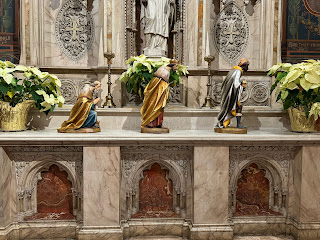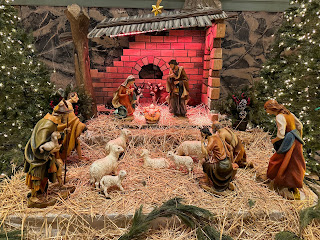Whatever the peculiarities of the U.S. Catholic calendar, at least New York City’s « Alternate Side of the Street Parking » calendar correctly recognizes today as « Three King’s Day, » one common name for Epiphania Domini (« The Epiphany of the Lord »).
Here in the United States, Epiphany now seems little more than a barely noticed, very vestigial postscript to Christmas. Historically, however, Epiphany is actually the oldest festival of the Christmas season. It is older than Christmas Day itself, and (noticed or not) it still ranks among the principal festivals of the Church’s calendar. In many more traditionally Catholic countries (Italy, Spain, Portugal, Latin America), it has long been the principal Christmas gift-giving day. In the Eastern Churches, Matthew’s story of the magi is read on Christmas Day, and Epiphany is primarily a celebration of Jesus’ baptism, the beginning of his mission as an adult. Here in the West, we will briefly postpone the principal commemoration of Christ’s baptism, focusing on Epiphany almost exclusively on the story of the magi.
Almost 20 years ago, in 2005, when I was a parish priest, I attended World Youth Day in Cologne, Germany. Cologne’s great Gothic Cathedral, which was the architectural model for New York’s famous Saint Patrick’s Cathedral, was originally built to house the relics of the magi, which were supposedly brought to Cologne by Emperor Frederick Barbarosa in 1164. Thus, the theme for the 2005 World Youth Day was We have come to worship Him [Matthew 2:2], and one of our World Youth Day activities was to walk across the Hohenzollern bridge as pilgrims to visit the cathedral and venerate the magi.
The magi, according to Pope Benedict XVI [Jesus of Nazareth: The Infancy Narratives, tr. Philip J. Whitmore, 2012], « were not just astronomers. They were ‘wise.’ They represent the inner dynamic of religion toward self-transcendence, which involves a search for truth, a search for the true God and hence ‘philosophy’ in the original sense of the word. »
Unlike Luke’s more popular Christmas account, Matthew’s story of the magi illustrates the paradoxes highlighted by Christ’s coming into the world. To quote Benedict XVI again: « What from the lofty perspective of faith is a star of hope, from he perspective of daily life is merely a disturbance, a cause for concern and fear. It is true: God disturbs our comfortable day-to-day existence. Jesus’ kingship goes hand in hand with his Passion. »
By way of warning, the story of the magi illustrates how easily we all may miss the point. When Herod heard the Magi, he was greatly troubled and all Jerusalem with him. They were troubled, instead of being overjoyed like the Magi! What troubled them? What made such good news seem to them like bad news? The same Christmas star that filled the magi with hope somehow seemed like an evil portent to those who sensed the threatening challenge it posed to their power and priorities. What disposes some people even today to misplace their priorities such that they too react to the good news of the Gospel as if it were bad news? The tragedy inherent in such misplaced priorities is highlighted in the story Herod. According to Saint Quodvultdeus [Sermo 2 de Symbolo], Herod resolved to kill the newborn Christ in order to save his own throne, « though if he would have faith in the child, he himself would reign in peace in this life and for ever in the life to come. »
And then there were those putatively wise religious experts whom Herod consulted. They correctly quoted scripture. But, for all their knowledge of the subject, they seemed to lack the knowledge they needed the most. Thus, none of them did the obvious thing, go to Bethlehem. Only the pagan magi did! Talk about missing the opportunity of a lifetime! Perhaps, that is the judgment to which the routinization of religion has made so many of us most liable!
The magi, on the other hand, were overjoyed, not troubled. The magi set out as true pilgrims – and on entering the house they saw the child with Mary his mother … prostrated themselves and did him homage. In the old liturgy when these words were read or sung in the Gospel on Epiphany, everyone was directed to genuflect. It was the liturgy’s dramatic way of physically bringing the point of the story home, helping us to identify personally with the pilgrim magi, experiencing what they experienced, prioritizing what they prioritized.
In the United States, January 6 every fourth year is also the statutory date for Congress to count the electoral votes for president and vice president. Since 2021, this date has become a sinister one in our national memory – like FDR’s « a date which will live in infamy. » It has become a vivid reminder of the lengths to which misplaced priorities and the pointless pursuit of unprincipled power may lead, once politics has been divorced from any transcendent purpose. Once again, we have been warned!
Photo: The Three Kings on their way to worship the Lord, Saint Paul the Apostle Church, NY.





